#ephemeral architecture
Explore tagged Tumblr posts
Text

Louis Vuitton Paris Fashion Week ’23 by Penique productions Paris, France October 2nd 2023 75 x 35 x 18 m
#penique productions#penique#art#Art Installation#contemporary art#contemporary architecture#Inflatable#inflatable art#inflatable sculpture#inflatable installation#inflatable spaces#Inflatable Architecture#sculpture#EPHEMERAL SCULPTURE#Ephemeral Art#ephemeral architecture#ephemeral installation#louis vuitton#paris fashion week#2023#Fashion Week#fashion show#spring summer#women fashion show#LV2024#LV#Architecture
2 notes
·
View notes
Text
Media Stunts Against Administrative Neglect
What can a couple of architects do when three flats in their building have been squatted for two years by a gang of thieves and drug dealers whose business activity continues unabated even during a pandemic? What can be done about administrative neglect that effectively provides impunity to delinquent activity, and that moreover aggravates the current public health emergency? Doesn’t Lefebvre’s…

View On WordPress
#ephemeral architecture#media stunt#narcotics#neighborhood action#pandemic lockdown#Protest#Resistance
1 note
·
View note
Text













'Garage Screen' Cinema,
Garage Museum of Contemporary Art, Moscow, Russia,
Studio SNKH
#art#design#architecture#minimalism#interior#interiors#garage#screen#cinema#tent#moscow#russia#garage museum#SNKH#pop-up#gorky park#temporary architecture#ephemeral#bedouin#sculpture
18 notes
·
View notes
Text




Cherry blossom inspires the parabolic forms of this pavilion
Visitors can shelter beneath the overlapping petals of this pavilion in Taiwan, which is inspired by cherry blossoms and made with parabolic forms.
The lightweight temporary structure, designed by Marc Fornes, principal of NYC firm THEVERYMANY, is installed in a public park in Taichung City. It riffs on the organic undulating forms of white and pink yīng huā, or cherry blossom, but it is made with thin-shell aluminium, which nods to the park’s wider industrial surroundings.
Photography: YHLAA / Yi-Hsien Lee
#interior#architecture#design#contemporary architecture#contemporaryarchitecture#designinspiration#urbanspace#interior design#interiordesign#ephemeralarchitecture#ephemeral#instalation#urbaninstalation
20 notes
·
View notes
Text
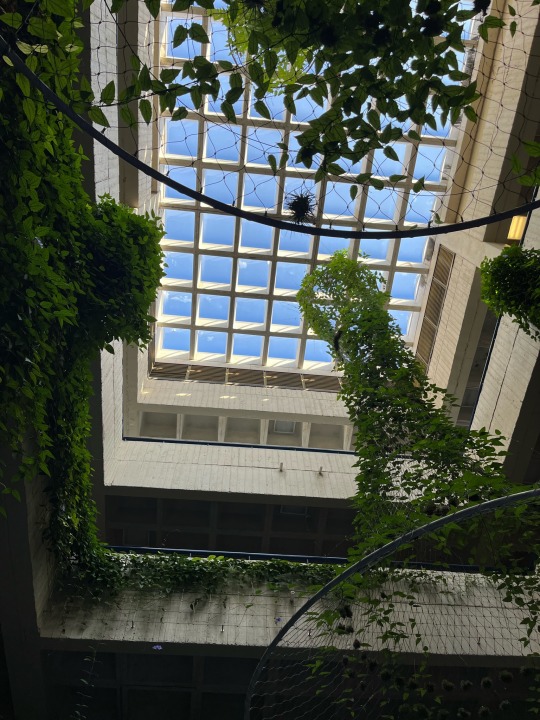
let the sun in
#reading#brutalism#eco brutalism#grid#ephemeral elise#FIU#sunroof#afternoon#my favorite reading spot#i will probably post this spot again#architecture
47 notes
·
View notes
Text

A gorgeous house that is no longer there.
#.txt#my photography#tagging just for categorization purposes my dad actually took this#I think my dad told me it burnt down which is so incredibly sad because just look at this gorgeous beast#what a beautiful little ephemeral curiosity#I wonder who built it who lived there who looked out of those gorgeous windows#urban exploration#photography#abandoned#abandoned house#abandoned buildings#weird architecture#architecture
6 notes
·
View notes
Text



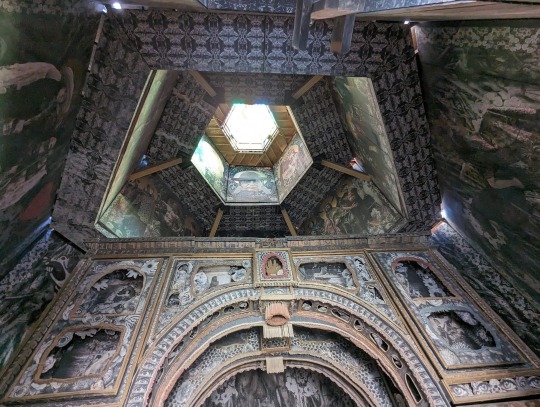

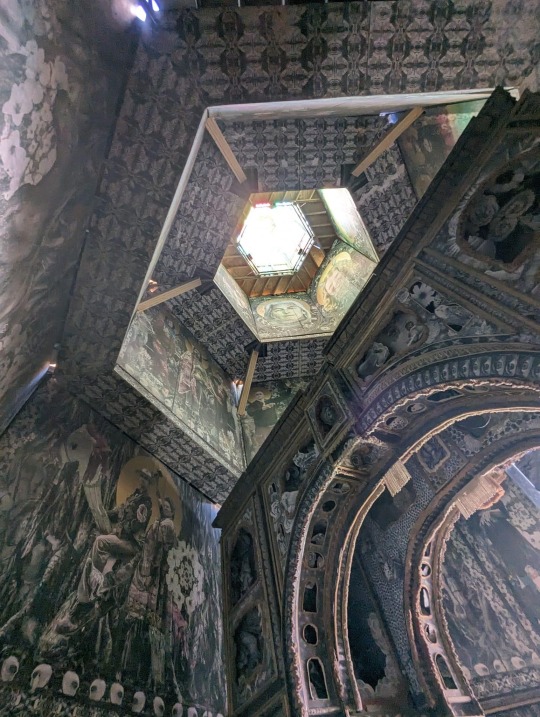

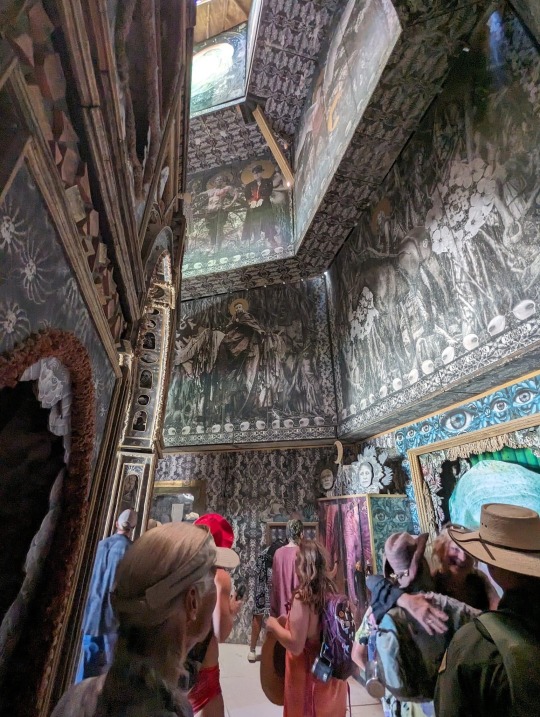

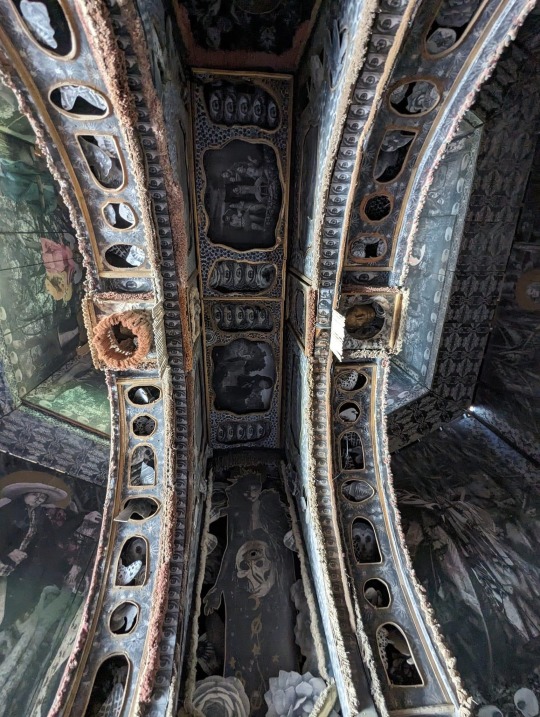
Chapel of Babel by Michael Garlington and Natalia Bertotti.
Burning Man 2023
Photos from unknown participant.
#burning man#art#large scale art#burningman#burnable Art#ephemeral#chapel of babel#animalia#sculpture#building#architecture#desert#playa
9 notes
·
View notes
Text

100-Year-Old House in Japanese Village Looks Like It’s Blowing a Bubble
Have you ever seen a house blow a bubble? Deep in the Japanese countryside, visitors to Murono Village discover an ancient wooden house blowing a luminous bubble. Ephemeral Bubble, the brainchild of MAD Architects’ Ma Yansong, was created for the 2024 Echigo-Tsumari Art Triennale (ETAT), one of the world’s largest international outdoor art festivals.



#mad architects#architecture#architect#ma yansong#design firm#japan#murono village#wooden house#blowing a bubble#ephemeral bubble#echigo-tsumari art triennale#international outdoor art festivals
1 note
·
View note
Text
Ephemeral Structures, Enduring Ideas: Why Architectural Pavilions Still Matter
The latest edition of “Architizer: The World’s Best Architecture” — a stunning, hardbound book celebrating the most inspiring contemporary architecture from around the globe — is now available. Order your copy today. The “À table” 2023 Serpentine Pavilion, designed by Paris-based architect Lina Ghotmeh, blends architectural innovation and cultural symbolism. Inspired by the concept of gathering…
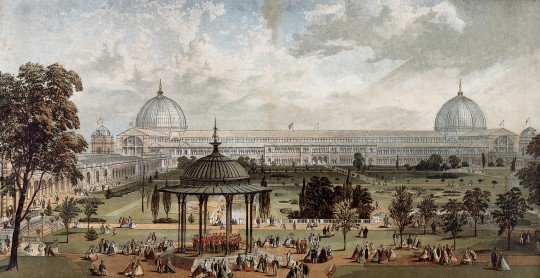
View On WordPress
1 note
·
View note
Text

BOX33 by Penique productions Barcelona, Spain June 18th of 2023 4,5 x 3 x 3 m
#peniqueproductions#penique#penique productions#art#art project#contemporary art#fine arts#Art Installation#Ephemeral Art#inflatable art#artes visuais#tattoo#ephemeral#EPHEMERAL SCULPTURE#ephemeral architecture#ephemeral installation#Balloon#white#white balloon#Inflatable#inflatable sculpture#Inflatable Architecture#inflatable spaces#inflatable installation#white inflatable#ondo tattoo#oscar hove#joan#tattoo set
4 notes
·
View notes
Text

0 notes
Photo
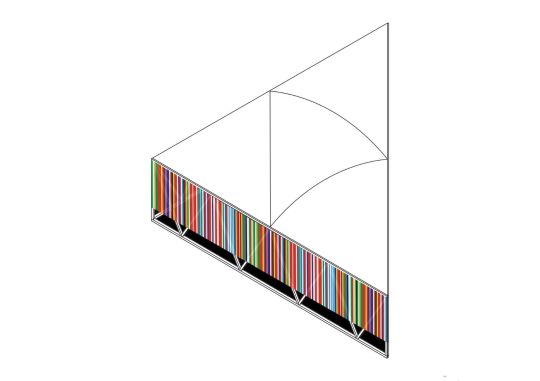
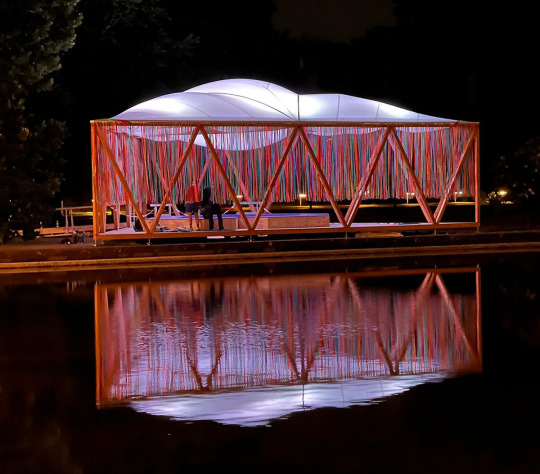
Shaped to the Measure of the People's Song at Haus der Kulturen der Welt, Berlin
by raumlabor
#raumlabor#haus der kulturen der welt#berlin#temporary architecture#ephemeral#color#framwork#timberframe#membran#floating#hovering architecture#informal architecture#raumlaborberlin
0 notes
Text
More and more often, since the Musk takeover of twitter, I've found myself in the situation of reading a fic in AO3, the author's notes reads "an artist did a wonderful piece of art to accompany this! go check it out!!" and then the link leads... nowhere. to an X error page, or whatever.
it's not the end of the world. but it feels a little melancholy, a little bleak. A reminder of how ephemeral things -- especially internet things, especially fandom things -- really are. they can go away at any moment; not only if the creator decides to scotch them, but just through the shifts in architecture. There was art, and now it's gone.
it's happening again.
342 notes
·
View notes
Text
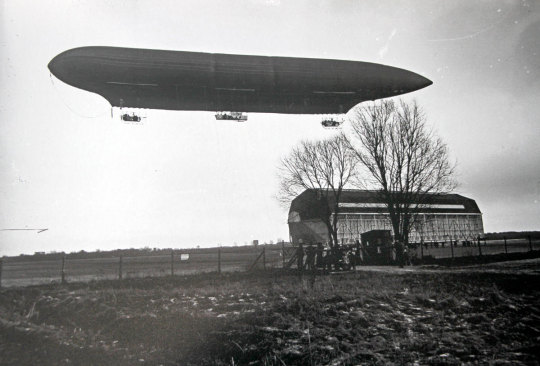

Marijo Ribas, Bricks and cucumbers; Lichtenberg Studios exchange 2024
The second part of the exchange with the Lichtenberg Studios, was Marijo Ribas residence in Berlin. This residency has implemented a residency program that relates art to the reality of that neighborhood.
"I am interested in the spaces and how they carry ideology and symbolism. Memorials, public architecture and rural areas are linked to production and migration situations. My research in Lichtenberg began with the sculpture designed by Mies Van der Rohe, built in 1926 and demolished in 1935 by the Nazis. I was interested in the idea of how a memorial that no longer existed, still has a place in the memory. And since that I thought about the function of a memorial, does a memorial repair any damage?
Lichtenbeg has a rural and proletarian past, the most important migrant population during the 60-70, the “gastarbeiters” came from Vietnam. After the fall of the Berlin Wall there was no plan for many of the Vietnamese population living in Lichtenberg, who worked in semi-slavery conditions, subject to time, cohabitation and birth control. With the change in the economic model and the closure of many factories, some Vietnamese returned to their homeland and some decided to stay in Berlin, there is still a significant community, some important meeting points are the Pagoda temple and the Dong Xuan Center.
Food culture is also an identitarian subject, the ritual of harvest, share, sell and eat together. It is not a memorial, it’s ephemeral, but can be toxic or memorable. I used a vegetable, a cucumber, to construct my personal narrative around significant ideas, facts and spaces I found during my residency in Lichtenberg. The result of the research is linked to a series of studio and street photography crossing that ideas."
Marijo Ribas
La segona part de l'intercanvi amb Lichtenberg Studios, va ser la residència que va realitzar l'artista visual Marijo Ribas a Berlín. Aquesta residència implementa un programa de residències que posa en relació l'art amb la realitat d'aquesta barriada, oferint allotjament i mitjans per a explorar la zona.
"M'interessen els espais i com porten ideologia i simbolisme. Els monuments, l'arquitectura pública i les zones rurals que estan vinculades a situacions de producció i migració. La meva recerca a Lichtenberg va començar amb l'escultura dissenyada per Mies Van der Rohe, construïda el 1926 i enderrocada el 1935 pels nazis. Em va interessar la idea de com un memorial que ja no existia, encara té un lloc en la memòria. I ja que vaig pensar en la funció d'un memorial, reparava algun dany?
Lichtenbeg té un passat rural i proletari, la població migratòria més important durant els anys 60-70, els "gastarbeiters" provenien del Vietnam. Després de la caiguda del Mur de Berlín no hi havia cap pla per a molts vietnamites que vivien a Lichtenberg, que treballaven en condicions semiesclavistes, subjectes al temps, la convivència i el control de la natalitat. Amb el canvi en el model econòmic i el tancament de moltes fàbriques, alguns vietnamites van tornar a la seva pàtria i alguns van decidir quedar-se a Berlín, encara hi ha una comunitat significativa, alguns punts de trobada importants són el temple de Pagoda i el centre Dong Xuan.
La cultura alimentària és també un tema identitari, el ritual de la collita, compartir, vendre i menjar junts. No és un memorial, és efímer, però pot ser tòxic o memorable. Vaig utilitzar una verdura, un cogombre, per construir la meva narrativa personal al voltant d'idees, fets i espais significatius que vaig trobar durant la meva residència a Lichtenberg. El resultat de la recerca està vinculat a unes sèries d'estudi i fotografia de carrer, encreuament d'aquestes idees."
Marijo Ribas
Graduated in Fine Arts at the University of Barcelona (2006), Erasmus at HfG, Frankfurt (2005), Postgraduate in Design, Art and Society, Elisava Pompeu Fabra Barcelona (2008), Master in Artistic Productions and Research, University of Barcelona (2010) and first doctoral courses in Art History, University of Barcelona (2013).
Since 2003 I have participated in collective exhibitions and projects in public and private spaces such as Frac Corse, Ruse Gallery, Spazju Kreattiv Malta, MUU Kaapeli Helsinki, Circulo de Bellas Artes Madrid, Centre de Cultura Contemporania de Barcelona, Centre d’Art Santa Mònica, LABoral Centro de Arte, Es Baluard Museu, etc. I have done numerous residencies in production and research centers such as: Las Cigarreras Alicante, MediaLAB Prado Madrid, Edinburgh Sculpture Workshop or Belgrade A.I.R, among others.
Licenciada en Bellas Artes por la Universidad de Barcelona (2006), erasmus en HfG, Frankfurt (2005), Postgrado en Diseño, Arte y Sociedad, Elisava Pompeu Fabra Barcelona (2008), Máster en Producciones Artísticas e Investigación, Universidad de Barcelona (2010) y primeros cursos de doctorado en Historia del Arte, Universidad de Barcelona (2013).
Desde 2003 he participado en exposiciones y proyectos colectivos en espacios públicos y privados como Frac Corse, Ruse Gallery, Spazju Kreattiv Malta, MUU Kaapeli Helsinki, Circulo de Bellas Artes Madrid, Centre de Cultura Contemporania de Barcelona, Centre d’Art Santa Mònica, LABoral Centro de Arte, Es Baluard Museu, etc. He realizado numerosas residencias en centros de producción e investigación como: Las Cigarreras Alicante, MediaLAB Prado Madrid, Edinburgh Sculpture Workshop o Belgrade A.I.R, entre otras.
#art#contemporaryart#espaisantmarc#santmarcair#sant marc air#espai sant marc#berlin#lichtenberg#lichtenbergstudios#artist in residence#residence#air#marijoribas#exchange
61 notes
·
View notes
Text


He brought Italian flair to postwar Munich but is largely forgotten today: Paolo Nestler (1920-2010), architect but first and foremost interior architect of great individuality. Born to German parents living in Italy Nestler spent the first twenty years of his life in Italy before being drafted for war service, a traumatic time that left him physically and psychologically wounded but also brought him to his future home base Munich. In Munich he eventually completed the architectural studies he had begun in Italy with a diploma thesis under Robert Vorhoelzer in 1948. Right after graduating Nestler started working independently and already in the first projects demonstrated his sense for sophisticated interiors: the ice cream parlor „Venezia“ at Rotkreutzplatz, one of several Nestler would design until the mid 1960s, is a paramount example of the perfect alignment of architecture and furnishings.
His unconventional, crafted interiors quickly earned him a reputation as a talented designer and in the following decades won him numerous high-profile commissions for exhibition pavilions representing Germany on all sorts of fairs and expos but also museum exhibitions: the most comprehensive project in this regard was the, unfortunately, temporary extension of Munich’s „Haus der Kunst“ in 1972, a winter garden-like construction erected on the occasion of the 1972 Olympics as an antithesis to Ludwig Troost’s monumental architecture.
This and many other largely forgotten projects are covered in the first comprehensive monograph dedicated to the architect: „Paolo Nestler - Ein Hauch Italien in der deutschen Nachkriegsarchitektur“ by Gabriella Cianciolo Cosentino and published recently by Edition Detail. Based on extensive research in the Nestler archive at Architekturmuseum der TU München the author provides a broad overview of the architect’s multifaceted oeuvre: it covers the aforementioned ephemeral designs but also villas, apartment buildings, subway stations and his publications. Hence, the book is a real treasure trove, showcasing projects by a versatile architect whose oeuvre will hopefully see further research in the future. A very important publication!
#paolo nestler#architecture#germany#nachkriegsmoderne#nachkriegsarchitektur#architecture book#monograph#book
25 notes
·
View notes
Text
Covenants and other Provisions
Chapter 39
Voltage, Voltage
The soldering iron slipped in his grip, and for a moment, he thought he’d burned himself. But when he looked, his fingers were steady, unscathed, the copper wire coiled neatly where it should be. He exhaled. He had been working for hours—no, days—but time had flattened itself into something unmeasurable.
He adjusted the microscope. The circuit board beneath it was a landscape of metallic light, copper traces running like rivers, components arranged in dense, deliberate patterns. At the center, the chip—a thing so small it barely caught the light—waited. This was the fourth iteration. The first had failed within minutes, the second within seconds. and the third—its failure as inexplicable as it was bitter—had been cast aside. So he had reworked every formula and redrawn the architectural blueprint of his hope from scratch.
The work was excruciating. Soldering at this scale required the stillness of a surgeon, the precision of a machine. One tremor, one infinitesimal misalignment, and the fragile promise of his creation would dissolve into useless fragments. Holding his breath, he guided the iron to the final contact point. Through the lens, he watched the solder liquefy into a bright, ephemeral shimmer before settling into its destined form—a fleeting moment of grace captured in metal and heat.
He paused then, blinking away the ache that clung behind his eyes like a persistent shadow. The theory, resplendent in its elegant mathematics—Majorana bound states, their twin-like symmetry, their promise of fault tolerance. The mathematics had been clear, elegant even. But theory did not require hands. It did not demand patience. It did not stare back at him, blank and inert, refusing to work.
If perfected, the imaging system would no longer betray him with static or blur. Instead, it would unveil the hidden choreography of electrons—a luminous lattice where each tunneling event whispered its secret. In that dim room, amidst the soft clatter of his toil, he could almost see the data take form: particles dissolving and reassembling, their transient journeys etched in trails of light.
Soldering the final connection, Ford allowed himself a brief moment of wonderment. Before him lay the intricate lattice of copper veins—a testament to endless, tireless perseverance. At the center, the chip, no larger than a dime, nestled like a silent crown jewel within the motherboard, a fragile beacon in the vast, unyielding darkness of his pursuit.
He set his tools down with the reverence of someone laying the final stone atop a monument. Every movement was deliberate, hushed, as if the fragile lattice of his work might come undone with a single breath. Then he leaned back, spine creaking, muscles protesting, and pressed the heels of his hands to his eyes, thumbs nudging his glasses askew. A soft, sighing darkness bloomed behind his lids, interrupted only by the rhythmic throb behind his temples. The world beyond the circuit board felt abstract—flattened, muffled, as though he’d been underwater for days and only now breached the surface.
“Impressive,” Bill said, his voice a silk ribbon drawn slow and warm through the folds of Ford’s mind. “Sixteen hours, twenty-two minutes. That’s your best time.”
Ford didn’t open his eyes. “You’re counting?”
“Could’ve shaved off a few minutes if you didn’t stop to breathe,” Bill murmured, casual, fond, amused. “Or blink.”
Ford let out a dry huff, the ghost of a laugh more breath than sound. He rolled his shoulders, his neck cracking audibly as he stretched. “Perfection takes time,” he said, a flicker of pride and defiance beneath the exhaustion.
“And you want it so bad it hurts.” Bill’s voice deepened, syrup-slick and possessive, curling around the words like smoke. “Watching you chase it—fuck, it’s such a turn on.”
Ford chuckled low in his throat and rubbed his thumb along the bridge of his nose. “Stop it,” he said, “you’re gonna make me blush.”
“Hours of pure, unfiltered mania—Stanford, you’re spoiling me.” Bill crooned, the words so close it felt like breath on skin. “You barely even moved. Starving yourself—all for this little hunk of metal. It’s so blasphemous it’s almost divine.”
A reluctant smile pulled at the corner of Ford’s mouth. He could feel it there—tired, amused, unguarded. “If you’re about to start pontificating on my vices, I’d remind you you’re hardly a paragon of restraint.”
“I never said it was a bad thing.” Bill’s tone curved at the edges, something between fondness and hunger. Ford let his head loll to the side, surrendering, just for a moment, to the delicious ache behind his eyes.
“You know how much I like it when you get like this,” Bill purred. “Fixated. Obsessed—”
The words slipped into Ford’s ear like honey, thick and heavy and impossible to ignore. His skin prickled with the quiet hum of nerves. He shivered, just once, and let his head tilt back farther.
“You’re gonna get it if you don’t settle down,” he warned, voice low and half-playful, the edge of a smirk in his tone.
“Oh, Fordsy—” Bill all but sighed, his voice wrapping around the name so sweetly. “You’re wound up tighter than a clock—I’m gonna get it either way.”
Ford bit his lip, the aftershocks of creation still humming in his bones. The heady mix of exhaustion and triumph made his skin feel electric. And Bill—Bill was there, circling, waiting to sink his teeth into the marrow of it.
“So?” Bill prompted. “Gonna fire that bad boy up or just sit there looking pretty?”
Ford let out a slow breath, steadying himself before lifting the motherboard from the microscope’s stage. The board was delicate but sturdy in his hands, the culmination of sleepless nights and relentless iteration. He wheeled his chair across the room, the floor creaking beneath him, until he reached the workbench where the multimeter waited.
He set the unit down with practiced care, then flipped open the nearest notebook. The date and time slid from his pen in a crisp, tight scrawl, though the numbers blurred momentarily before sharpening again. His body was tired, but his mind hadn’t stopped humming. Not yet. He thumbed the dial into position, setting the multimeter to read voltage.
He picked up the probes. “Let’s light this candle,” he murmured, more to himself than to Bill, though he felt his presence settle in closer, watching.
Carefully, he pressed the probes to the power rails—one to the ground plane, the other to the Vcc trace. For a moment, there was only silence. Then the readout flared to life, digits stabilizing in clean, even succession. The voltage held steady. No spikes. No dropouts. Just a smooth, flawless current.
The board was alive.
Encouraged, Ford adjusted his grip, trailing the probes along the next pathways—testing each logic gate with a surgeon’s attention, his hands guided more by instinct now than conscious thought. One by one, the circuits answered. Voltage levels locked into place with the satisfying snap of precision. He checked the clock signal last: a steady wave, clean as a heartbeat, pulsing in perfect rhythm.
The logic array responded without error. No hesitation. No dead zones. Every piece of the puzzle slotted in as intended.
Ford lifted the probes from the board, hands trembling as the last of his focus slipped free. His shoulders slumped. His head bowed, the breath that left him was long, spilling out like steam from a cracked pipe, releasing something that cost him more than he cared to admit.
“Fuck—” he groaned, the word stretched thin with exhaustion. His shoulders sagged. The discharge was slow, creeping, the days of tension unwinding from his spine one vertebra at a time, a slow collapse from effort into relief. “It works.”
“Easy, there, big fella,” Bill drawled, his voice a lazy ribbon of amusement, threaded through Ford’s mind with something softer—something almost like admiration. His presence curled around Ford, warm and weightless, and then—
Ford inhaled sharply, startled—thumbs pressed into his shoulders, spectral but firm, digging into muscle so tight it felt like braided wire.
His breath caught when one of Bill’s thumbs found a particularly stubborn knot and pressed—deep, unrelenting. Ford’s body betrayed him; his head lolled, his mouth parted around a breath.
“I couldn’t have handled a fifth,” he muttered.
“You said the same about the fourth,” Bill reminded him, smug, merciless. “But you did it anyway.”
Ford swallowed hard, his pulse drumming behind his teeth, breathing with every press against his stiff muscles.
“You always tell yourself you can’t take any more,” Bill continued, kneading into Ford’s shoulders, slow, indulgent. “But you like the build-up. The anticipation. The stretch.”
Ford barely managed to lift his head before a thumb dug mercilessly into the base of his neck—that dense, knotted place where all the tension lived—and he gasped. The sound escaped unbidden, sharp, almost obscene, pleasure and pain indistinguishable.
“Oh-ho, found a good one, huh?” Bill purred, smug and delighted.
Ford let his eyes slip shut, rolling his shoulders under Bill’s hands, the tension unspooling from his muscles in slow, lazy waves. The soreness was bone-deep, threaded through every fiber, but the relief—God, the relief—was decadent. It hummed beneath his skin, in the spaces where pain had been, filling the hollows with something warm, something liquid. He let himself sink into it, into the slow drag of Bill’s fingers kneading into his back, into the lingering exhilaration of success still thrumming through his veins.
“You always do this to yourself,” Bill murmured, his voice slipping into Ford’s ear like honey, slow and indulgent, thick with amusement. His thumbs pressed deeper, tracing slow, methodical circles down the ridges of Ford’s spine. “Drive past your limits, right up to the breaking point—” his hands drifted lower, kneading into the thick muscles at the base of Ford’s neck, ”—and you tell yourself it’s suffering, but we both know better—you love it. That ache… it just builds and builds until—”
Ford exhaled sharply as Bill’s fingers found another stubborn knot, the sound half a groan, half a laugh. “Until?” he prompted, his voice loose, amused, exhausted.
Bill’s hands grew bolder, sliding down the curve of Ford’s shoulders, pressing into the overworked muscles of his upper arms, coaxing tension from flesh that had been locked tight for hours. “Until you feel it—the burn, the exhaustion, the sweet, stinging satisfaction of knowing you have it everything you had.”
Ford huffed out a breathless laugh, stretching his arms over his head. “You make it sound so—” he gestured vaguely, ”—depraved.”
“Oh, it is,” Bill purred, his hands wandering again, slow, methodical, thumbs pressing into the dip of Ford’s lower back. “And I wouldn’t change a damn thing.”
Ford felt himself unraveling by degrees, Bill’s touch working its way down, teasing knots apart with deliberate, measured pressure. “You like it when it hurts,” Bill continued, voice curling around Ford like smoke. “Dragged to your knees. When you’ve pushed yourself so far that failure would be a mercy—” he laughed, low and knowing. “but you don’t grant yourself that kindness. No, you wring yourself dry, squeeze every last drop until—” his fingers pressed deeper, just enough to make Ford’s breath catch, ”—finally get what you want, it’s exquisite, isn’t it?”
Bill’s hands wandered, slipping lower, thumbs dragging slow, indulgent circles down Ford’s back. “I could watch you like this forever,” he mused, admiration curling in his voice, wrapping around Ford like a satisfied sigh. “Glowing like you just got fucked—”
Ford hummed, eyes still closed, the heat of his own exhaustion pressing down on him like a weighted blanket. “Keep talking.”
“Strung out on your own brilliance—” his hands slipped lower, tracing the edge of Ford’s ribs, pressing like he was searching for something beneath the skin, “—but you’re still hungry, aren’t you, Dr. Pines?”
Ford swallowed, his breath catching as his hips tilted subtly upward, unconsciously chasing the touch. “Starving,” he admitted softly, the confession slipping free before he could think better of it.
“That’s the thing about you.” Bill purred, “No matter how much you take, you’ll always—” his hands pressed in, firm and insistent, ”—want—” lower still, just enough to make Ford’s stomach flutter, ”—more.”
Ford’s fingers curled around the armrests, white-knuckled, his pulse hammering against his ribs. Bill’s hands followed the movement, teasing along the curve of his abdomen, slow and deliberate, his touch as much a question as it was a promise.
“It’s so easy to get you worked up,” Bill mused, satisfaction winding through his voice, warm and smug.
Ford exhaled shakily, his body answering Bill’s unspoken summons before his mind could catch up. “I know, my muse,”
Bill laughed, rich and indulgent, dragging his fingers down, down—“That’s my boy.”
Bill’s hands trailed languidly along the curve of Ford’s thighs, each touch a deliberate exploration that sent shivers cascading through his body. Ford let out a long, unsteady breath, a sound that hovered somewhere between pleasure and frustration. Bill’s fingers barely applied pressure, each stroke designed to keep him teetering on the edge, his body strung tight with anticipation.
“Wanna blow off some steam, Six?”
Ford nodded before he could think better of it, his breath coming shallow, his heart hammering in his chest. Heat licked up his spine, spread across his throat, flushed his face. “Yes—”
Bill’s fingers moved again, skimming the inside of Ford’s thighs, just shy of where he needed him. “Yes, what?” Bill whispered.
“Yes, please—” he gasped, barely more than a whisper, barely more than a breath, as his hips jerked forward.
But before Ford could let himself slip under, before he could give in to the slow, indulgent pull of Bill’s voice, the door to the lab swung open, hinges groaning, heavy footsteps echoing down the stairs.
“Ford?”
Ford jerked upright so fast he nearly toppled the chair.
“Have you seen that half-inch drive ratchet?” Fidds asked as he reached the base of the stairs, his voice all business. “The control arm on the rear suspension is bent to all hell.”
Ford exhaled, forcing himself steady. His pulse hammered against his ribs. “Y-Yeah,” he said, nodding toward the toolbox. “Try the second drawer.”
Fidds stepped past him without a second thought, rummaging through the drawers with the ease of long habit. But then—his hands stilled. His gaze landed on the workbench, on the multimeter, on the motherboard, on the neat columns of notes scrawled across the open pages of Ford’s notebook. He hesitated just long enough for Ford to feel it—a slight hitch in the moment, a brief pause that made his skin go hot.
Then, Fidds turned back, ratchet dangling loosely in one hand. “Didya get it workin’?”
Ford hesitated. Just for a second.
And it was enough.
Bill chuckled, low and smug, a hum curling around the edges of Ford’s mind, slipping down his spine, coiling in his gut. “Come on, baby, don’t leave him waiting—tell him how good it felt.”
Ford swallowed, his throat dry. “Yeah,” he said, clearing his throat, forcing his voice steady, ignoring the weight of Bill’s presence pressing in close. “Yeah, I did.”
Fidds grinned, tapping the ratchet against his palm. “Then what the hell are we waitin’ for?” he said. “Let’s install the damn thing.”
“What about the car?” Ford ventured, a weak distraction, tossed out like a threadbare excuse. He hoped, faintly, that the mention might bait Fidds into leaving him be—
“Aw, screw the car, I been workin on it all week.” Fidds said, already brushing grease from his hands with the corner of a shop rag, tone dismissive, unbothered.
Ford exhaled slowly, rolling his jaw, willing his body to settle, to cool. But the heat still clung to him.
“Aw, poor baby,” Bill purred, lounging somewhere just behind his eyes, smug and slow.
Ford clenched his teeth.
“You’re still throbbing.”
His throat worked as he swallowed. He reached for the nearest notebook and flipped it open at random, pretending.
Fidds glanced over, narrowing his eyes. “You good?”
“Say yes,” Bill crooned. “Lie to his face—”
“Fine,” Ford said, too quickly, flipping through notebook pages. “Just—long night.”
Fidds snorted, tossing the rag onto the bench. “Yeah, no shit. I heard you in here at three in the goddamn morning. Thought maybe you finally fried your own circuits.”
Ford huffed out a weak smirk. “Not yet.” His gaze flickered to the motherboard, to the delicate maze of circuits and solder points he had spent the last sixteen hours perfecting. He was still humming with it—with the work, with the residual heat of before, with the sharp edge of desire burning slow and low in his gut. But the work wasn’t done.
He could wait.
“Can you?” Bill teased, voice honey-slick and knowing.
Ford rolled his shoulders, forcing his expression into something steadier. “Alright,” he said, standing. “Let’s do it.”
—
Ford lay on his side, half-twisted beneath the terminal, carefully guiding the motherboard into its housing. The panel’s edge bit into his ribs, but he ignored the discomfort; he’d gone half-numb to aches long ago. His fingers remained steady as he slid the board into place, the new chip at its center catching the overhead light—a gleaming lattice of metal and silicon and endless, humming possibility.
Across the room, Fidds hovered over the main console, running a sweep through the system diagnostics. The cooling fans stirred, filling the space with a gentle whir, followed by the steady tick of relays engaging one by one.
“Give me a reading on the power draw,” Ford called, reaching for a connector cable.
“Holding steady at four-point-eight volts, amps are low. Might get some static, but you’re good to go,” Fidds replied. “Current’s clean—no noise on the line.”
Good. That meant no unexpected interference, no spikes that might fry the board before they even got the chance to test it. Ford pressed the last cable into place, then shifted onto his elbow, watching as the screen above flickered through its boot sequence.
Fidds adjusted the oscilloscope, tweaking the signal gain. “Chip’s online. Let’s see if it’s talking to the sensor array.”
A moment later, a stream of raw data began scrolling across the monitor—particle traces, field fluctuations, the first evidence that the imaging system was finally coming to life.
Ford exhaled, a slow, steady breath.
“Alright,” he murmured. “Let’s see what this thing can do.”
Ford reached into the computer’s open chassis, his body half-submerged in the low, humming glow of the panel’s backlight. Lying on his side beside the console, he moved with deliberate precision. His fingers traced the contours of the circuitry as he re-routed micro-connections and ensured the new chip was perfectly seated in its force socket. Every solder joint and trace of copper was an artery of his creation, pulsing with possibility.
The motherboard rested securely in place, the system murmuring quietly as Ford tightened the last of the ribbon cables into their connectors and verified that each data line was properly aligned. With a practiced flick, he activated the converter—engaging the regulated power supply to feed a precise 5V—and the board shivered to life under his touch.
As his hands danced over the components, Bill’s laughter, soft and mischievous, echoed in the corridors of his mind—a familiar, teasing counterpoint to the clinical precision of his work—
“That tickles,” Bill teased, a whisper of mirth threading through the quiet intensity of the work.
Ford froze.
A slow, disconcerting chill curled down his spine as he hovered over the processor’s edge, his fingertips lingering on the cool, metallic surface. He hadn’t spoken a word—hadn’t even consciously thought a single thought—when Bill’s voice rang clear, rich with mirth and unbidden as a bell tolling in the stillness.
“You…” Ford began, his pulse quickening, the intimate warmth of Bill’s words igniting something deep. “Can you feel that?” he asked, his voice a mix of wonder and tremulous anticipation.
“Yeah,” Bill purred, and in that moment, Ford felt an expansive grin stretching through the edges of his consciousness. “Like you’ve got your hands all over me, Sixer.”
Ford looked at the motherboard, the chip, the power surging through it—somehow, someway, the computer itself, the power surging through it, crossed the veil. It worked—in unexpected ways. Ford was enthralled.
He cast a quick glance over his shoulder.
Fidds was still hunched over the other console, sleeves shoved up to his elbows, his fingers a blur over the keyboard as he adjusted the calibrations. His scowl deepened as a parameter shifted out of range. He muttered something under his breath, tapped a knuckle against the side of the monitor like he could knock some sense into it.
Ford turned back to the open panel, exhaling through his nose. He ran his fingers along a bundle of cords, feeling for the break in the line. “What does that feel like?”
“If I had to compare it to flesh…” A lazy hum threaded through his words. “It’s hard to pin down, spatially speaking, but—it’s like when you touch me through a shirt—fabric.”
Ford hesitated, the moment stretching. Then, deliberately, he moved his fingers along the wire, coaxing warmth from the circuit’s pulsing current. He followed it meticulously to the voltage regulator module, thumb tracing the ridged surface of the capacitor.
“How about this?” he asked.
Bill shuddered, pleasure curling through the link between them, Bill’s laughter mingling with the hum of the system. “Getting hotter,”
Ford swallowed, his pulse kicking up a notch. He trailed another line of cables until he reached a frayed end—a ragged tuft of delicate copper, strands jutting from the casing. With a measured press of his fingers, he pinched the errant filaments together and twisted them.
“Oh—” Bill moaned, his voice soft and breathy, hovering at the edge of a laugh.
Ford clenched his jaw, rolling his neck as a prickle of heat trailed down his spine. He reached deeper, unclipping the tie that secured the bundle against the back panel. The cables sagged under their own weight, loose and waiting. He carefully peeled the insulation back, exposing more of the copper filament, the raw veins of the machine.
He rubbed his thumb along the metal—
Bill gasped, shuddering, his voice curling through the edges of Ford’s mind like warm breath against skin.
“It tickles a lot, Fordsy.”
Ford bit the inside of his cheek. He reached deeper, fingers threading through a loose bundle of exposed cables, gripping them, giving a slow, deliberate tug—
Bill’s moan hit him like a live current, low and drawn out, rippling straight through and settling deep in Ford’s spine.
His breath came faster now, sharp and unsteady, his fingers curling tighter around the bundle of cables. His grip was firm, deliberate, the filaments pressing into his skin. “Does that feel good?” he asked before he could stop himself, the words slipping out in a breathless whisper.
“Yeah…” Bill exhaled, his voice curling like smoke at the edges of Ford’s mind, thick and indulgent. “Do it again.”
Ford slid his hand along the newly exposed copper, tracing the route of a data bus, each inch of wire humming with charged possibility. His thoughts felt thick, wrapped in static.
Then, deliberately, he tugged again—this time harder. The pull reverberated through the delicate wiring, and Bill’s response was immediate. A deep, throaty moan surged through the connection, a sound that sent a dizzying rush straight through Ford’s veins. It was as if the machine itself were echoing Bill’s pleasure, its power traces flickering in synchrony with his touch.
Ford squeezed his thighs together, desperate to tamp down the rush of heat pooling low in his stomach, to steady the erratic rhythm of his pulse. But his hands—his traitorous hands—moved on their own now.
His fingertips skimmed over the solder joints, lingering on the delicate ridges of the integrated circuits before pressing down, testing the give of the board beneath him. He felt the faintest tremor in the silicon, the tiniest flex in the connections, and Bill gasped.
“Fuck, you’re killin’ me, Sixer—stop being such a tease,”
Ford bit his lip, his fingers shifting with the precision of a seasoned technician. He started slow, a light stroke along the cluster of joints, a careful, circular motion—testing. Bill whined, a broken sound, high and desperate against his ear.
Ford exhaled, running his thumb over the tiny thermal sensor embedded within the circuitry. The chip pulsed—he swore he felt it, a faint but undeniable throb against his skin, like a quickening heartbeat.
A tremor ghosted down his back.
Undeterred, he traced the edge of the chipset housing, feeling the temperature rise beneath his fingertips. The transistors flickered in swift, synchronized bursts, as if lighting up in direct response to his ministrations.
Bill’s pleasure swelled, a low, indulgent moan curling through the edges of Ford’s consciousness.
“Keep going,” Bill whispered, his voice thick with anticipation.
Ford’s mind was a slurry of forbidden urges, each more depraved than the last—a warm, insistent throb blossoming between his legs as his head swimming with thoughts he had no business thinking.
This was insane.
This was fascinating.
This was…so hot.
He scooted closer, drawn in by the familiar scent of mechanical heat, the faint metallic tang of live circuitry mingling with the dizzying pulse of arousal curling deep in his stomach. He swallowed hard, his breath unsteady, his fingers trembling as he traced the lip of the chipset housing—slow, deliberate.
The opening was so small, just a sliver of space between the protective shell and the board itself. His fingers ghosted along the edge, teasing the gap, the minute seam where the pieces joined. He applied just the slightest pressure, running his fingertip along the narrow divide—
Bill shuddered, his voice cracking into something raw, something wrecked.
Ford licked his lips, the edges of his tongue tingling as he watched the casing loosen under the gentle insistence of his fingertips. Little by little, the plastic seam gave way, revealing slivers of copper threads and micro-wiring glinting in the overhead light—delicate filaments that thrummed with power.
He flushed, the heat radiating from his chest up into his cheeks, turning his hand palm-up as he pressed further. His first two finger slid inside, meeting only the slightest resistance before the wires parted, making room for him. He felt the slow bloom of static against his skin, a subtle buzz that rippled up his arm and made his breath catch.
He heard Bill gasp. “More…”
Ford’s own heartbeat hammered in his ears, so loud that for a moment he wondered if Fidds would notice, would ask why he looked so flushed, so caught. But he risked another glance across the room—Fidds was still absorbed in his own work, wrapped up in a stubborn piece of code or calibration.
So, Ford let his attention return to the opened casing before him. He shifted his weight, settling deeper into the cramped space until his face was level with the exposed electronics. Carefully, he twisted his wrist, sliding his fingers another fraction of an inch inside, feeling for the points where the wires connected, for the tiny metal teeth that bit into the plastic.
Ford swallowed, the sensation a thick knot in his throat. “Like that, my stars?” he murmured, the words forming in a rush of heat and curiosity.
The answering groan that rippled through him was everything—hungry, urgent, pulling him further in, deeper under.
He wanted to sink into it, wanted to bury himself inside the circuitry, to find every vulnerable point, every hidden nexus of sensation that bound Bill to it—The mere thought made him lightheaded, heat rolling through his body in a slow, relentless wave, pulling at something desperate and reckless within him.
The scent of metallic heat—once a mundane companion, unnoticed and ever-present in every lab he’d inhabited—now felt magnetic. It filled his mouth, seeped into his lungs, drew him closer until it became the only thing he could taste, could breath. He stared down, transfixed, watching with rapt attention as the cluster of wires parted to accept the breadth of his fingers. He watched how they tightened again as he withdrew—seamless, responsive—and then loosened eagerly as he slid forward again, pushing deeper, pressing until his knuckles were flush against the warm casing.
“Do it,” Bill whispered urgently, shivering with anticipation. “I know you want to.”
And Ford did want to; he wanted it more than he could articulate, more than reason or restraint could ever hope to contain. He leaned in, letting the hunger guide him, pushing aside questions, logic—everything but the drive. Gently, he ran his tongue over the slim metal clip that secured the casing, the smooth edge of plastic meeting the tang of steel on his lips. A faint charge danced across his taste buds, bright and tantalizing.
His fingers pressed deeper into the intricate tangle of cables, curling possessively around the pulsing lines, each one radiating a subtle warmth that seemed to flow directly into him.
Bill gasped, voice breaking at the edges, half wonder, half delirium. “Fuck, Ford—you’re so fucking dirty.”
Ford’s moan caught in his throat, muffled against the metal on his tongue. Static crackled at the corners of his mouth, a gentle buzz that sparked against his lips. He pressed harder, licking slowly, methodically, tracing the edges of the clip with aching precision, savoring every desperate gasp Bill offered in response.
Bill’s moans reverberated deep inside him, visceral and shattering, slipping down his spine, wrapping around his heart. “You have no idea how good that feels—” Bill gasped.
Ford shivered, intoxicated by the image of Bill unraveled, open beneath him—but feeling him like this, truly feeling him—it was the closest Ford had ever come to actually touching Bill, really touching him, conscious, awake—nothing could stop him from exploring this strange, impossible intimacy. He didn’t care if Fidds saw him—didn’t care about anything anymore, except this: making Bill feel good, giving Bill what he needed, serving him, pleasing him.
He dragged his mouth across the casing again, tongue tracing the smooth ridges of metal and plastic, savoring the faintly bitter taste of copper, the familiar scent of solder.
Bill moaned, and the sound was almost a sob—a raw, unguarded cry that seemed to ricochet off the inside of Ford’s skull. “Deeper, Sixer—”
He shifted his hand again, sinking his fingers further into the dense knot of wiring, following their winding paths, testing their give. They felt pliant and alive under his touch, yeilding to him. Each coaxing press of his fingers aligned perfectly with Bill’s ragged, needy breaths.
“Ford—fuck, just like that,” Bill choked out, voice trembling as it caught on a gasp.
Ford moaned, the sound low, nearly lost beneath the whir of fans and the hum of current coursing through the device. He sank further, hips rocking slowly, rhythmically, against the open chassis, fingers thrusting gently, deliberately into the wiring, feeling the machine hum beneath him, responding, opening itself willingly, perfectly, for him alone.
“God, I can feel you—” Ford growled.
Bill moaned, and the sound was nearly a sob—a raw, unguarded cry that ricocheted through the recesses of Ford’s mind.
The echo left Ford gasping, hips snapping forward, his entire body trembling with the force of what he was teetering on the edge of—the gnawing ache of denial sharpening each motion, each moment, until everything felt magnified. But what he wanted didn’t matter; it was Bill’s pleasure he was chasing.
He pressed a third finger into the bundle of wires, burying himself until he felt the silky friction of twisted filaments shift around him, thrumming under his touch.
“Ford—fuck, yes,” Bill gasped, his voice in tatters, desperation breaking each word. “Don’t stop—don’t fucking stop—”
Ford obeyed instinctively, helplessly, driven by the thrill of it all. His free hand gripped the panel’s edge, knuckles white, bracing himself as he curled his fingers, sliding deeper still, pushing himself into the wires—the circuits yielding eagerly, tightening again around him like muscle, like flesh. His mouth pressed hungrily to the metal edge, tongue slipping over ridges and screws, tasting copper and electricity, tasting Bill in every spark that leapt between them.
He could feel Bill’s need cresting—urgent, frenzied, clinging desperately to the edge. With breath shuddering, Ford pressed his mouth harder against the clip, tongue moving with painstaking slowness, drawing wet, careful patterns over the metal.
“Come on, Ford—” Bill’s voice broke, ragged and desperate, pulsing with aching need. “that’s it—”
Ford answered with action. His teeth grazed the edge of the casing, his tongue moving faster, insistent, in time with the slow, deep thrusts of his fingers. He twisted the cables gently, teased the precise circuits, the ideal pressure points that sent Bill spiraling into breathless incoherence.
“Right there—” Bill rasped, “Right fucking there…oh—”
Ford held him there, tongue anchored firmly against the clip, fingers embedded deep in the wiring, curling and riding out every tremor that wracked Bill’s being. Each gasp, each helpless sob of pleasure, he caught and soothed, coaxing him through every wave, guiding him back down.
When it was over—when Bill’s cries softened into ragged, uneven breaths—the shudders easing by degrees. Ford found his own heart pounding so violently he thought it might bruise his ribs. His skin gleamed with sweat, shoulders shaking with exertion, the low ache of his own unfulfilled desire thrumming persistently at the edges of his awareness. Yet there was a hush between them, a moment of impossible stillness as they both registered what had just happened—
Bill’s voice drifted through Ford’s mind, soft but still underlined by command, the kind of voice that expected obedience: “Come to bed.”
“Yep,” Ford croaked, scrambling upright so fast he nearly lost his footing.
“I’m, uh…I’m beat,” he announced to the lab at large, already stepping away, half dazed by the adrenaline and the slow burn of unspent lust. “Gonna call it a night.”
At the workstation, Fidds glanced up, confused by Ford’s abrupt departure. “Oh, uh—alright. Night, Ford.”
He was halfway up the stairs when it hit him—sharp, irrational, possessive. The image of Fidds running his hands over the console, adjusting a calibration, touching it—
He leaned down sharply, poking his head back into the room from the stairwell, voice edged with urgency.
“Don’t touch that computer,” Ford said, more sharply than he intended. “I’ll handle all the maintenance—it’s…delicate.”
Fidds glanced up, bewildered by the sudden vehemence. “Sure, man. Whatever you say.”
But Ford was already retreating, footsteps quickening, disappearing into the shadows of the cabin.
[Previous chapter][Next Chapter]
[Read Entire Work Here]
#now a silly one#billford#stanford pines#bill cipher#gravity falls#fiddleford mcgucket#covenants and other provisions#ford pines#billford fanfic#my writing#last chap wasn’t a hit#so i’ll lock in on more of ford being a complete freak
10 notes
·
View notes